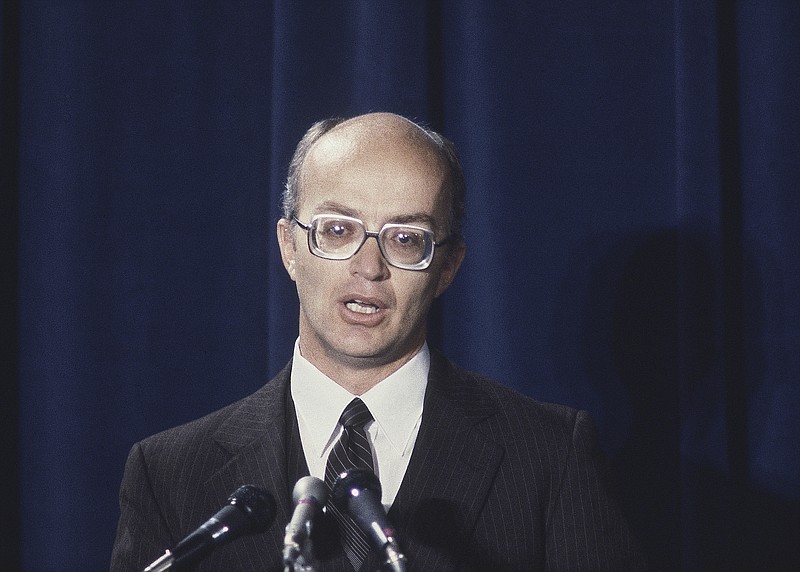CHEYENNE, Wyo. -- James Watt, the Reagan administration's sharp-tongued, pro-development interior secretary who was admired by conservatives but ran afoul of environmentalists, Beach Boys fans and eventually the president, has died. He was 85.
Watt died in Arizona on May 27, son Eric Watt said in a statement Thursday.
In an administration divided between so-called pragmatists and hard-liners, few stood as far to the right as Watt, who once labeled the environmental movement as "preservation vs. people" and the general public as a clash between "liberals and Americans."
In that sense, Watt foreshadowed combative Interior secretaries such as Ryan Zinke and David Bernhardt, who also aggressively pushed to grant oil, gas and coal leases on public land, increase offshore drilling and limit expansion of national parks and monuments.
"While no one's death should be celebrated, he was the worst of MAGA before it was invented," tweeted David Doniger, a senior strategic director at the environmental group Natural Resources Defense Council, referring to former President Donald Trump's "Make America Great Again" slogan.
Watt and his supporters saw him as an upholder of President Ronald Reagan's core conservative values, but opponents were alarmed by his policies and offended by his comments. In 1981, shortly after he was appointed, the Sierra Club collected more than 1 million signatures seeking Watt's ouster and criticized such actions as clear-cutting federal lands in the Pacific Northwest, weakening environmental regulations for strip mining and hampering efforts to curtail air pollution in California's Yosemite Valley.
With his bald head and thick glasses, Watt became the rare interior secretary recognizable to the general public, for reasons beyond the environment. He characterized members of a coal advisory panel using derogatory language and in 1983 tried to ban music from Fourth of July festivities on the National Mall, saying it attracted the "wrong element."
The Beach Boys had been recent mall headliners, and their fans included Reagan and the first lady. With Watt's statement facing widespread mockery, the Reagans invited the Beach Boys to the White House. Watt, meanwhile, was summoned to receive a plaster model of a foot with a hole in it.
In his 1985 book "The Courage of a Conservative," Watt wrote that the controversy "actually arose because I was a conservative. Members of a liberal press saw an opportunity to create a controversy by censoring the facts and avoiding the real issues." He said the initial stories about the rock music ban "only mentioned that the Beach Boys had performed in the past. Yet before we knew what was happening, banner headlines proclaimed that I had banned the Beach Boys. I was astonished."
Cutting regulations was his primary mission. Between the time he was confirmed as Interior secretary in 1981 until he resigned under pressure in 1983, Watt implemented an offshore leasing program that offered virtually the entire U.S. coastline for oil and gas drilling and held the largest coal lease sale in history, auctioning off 1.1 billion tons of coal in the Powder River Basin of Montana and Wyoming.
Watt tripled the amount of onshore land being leased for oil and gas exploration and doubled the acreage leased for geothermal resources.
He did spend $1 billion to restore and improve national parks and added 2,800 square miles to the nation's wilderness system. And his efforts to exploit natural resources made America stronger, he wrote to Reagan in 1983.
"Our excellent record for managing the natural resources of this land is unequaled -- because we put people in the environmental equation," Watt wrote.
But eight days after writing to the president, he rode horseback into a cow pasture down the road from Reagan's California ranch to announce his resignation. He was succeeded by a longtime Reagan aide, William Clark.
"I had outworn my usefulness," Watt said.
Information for this article was contributed by Matthew Daly of The Associated Press.
